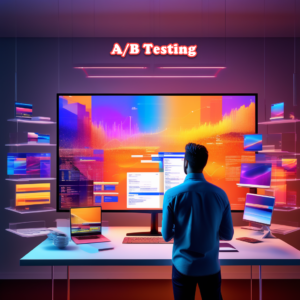Transforming Healthcare : ChatGPT’s Evolution in Medicine
Within the ever-evolving field of healthcare, technology advancements have been crucial in improving patient care, optimizing workflow, and advancing clinical assessment. Among these advancements, artificial intelligence, or “simulated intelligence,” has emerged as a special benefit that provides remarkable solutions for intricate problems in the healthcare domain. OpenAI’s ChatGPT language model is one such marvel of artificial intelligence that has garnered remarkable attention. ChatGPT in healthcare is revolutionizing the way medical professionals interact with technology, offering innovative solutions to challenges in diagnosis, treatment planning, patient engagement, and more. We’ll explore the uses, advantages, limitations, potential future developments, and ethical considerations surrounding ChatGPT in the field of medicine.
Applications of ChatGPT in Healthcare:
Clinical Decision Support:
ChatGPT provides real-time clinical decision support to healthcare workers, acting as a virtual assistant. It may offer tailored suggestions for diagnosis, treatment regimens, and drug administration by examining patient data, medical literature, and guidelines.

Medical Documentation and Transcription:
ChatGPT’s natural language handling capacities make it skilled at healthcare applications, including clinical record and documentation. It can change over voice correspondences or transcribed notes into organized electronic wellbeing records, saving time for medical care suppliers and further developing precision. This transformative ability streamlines administrative processes in healthcare settings, providing an efficient solution for managing patient records and facilitating seamless communication among healthcare professionals.
Patient Engagement and Education:
ChatGPT-powered virtual assistants can engage with patients, answering their queries, providing health information, and offering guidance on lifestyle modifications. This fosters patient empowerment and facilitates better adherence to treatment regimens.
Research and Data Analysis:
ChatGPT can be used by researchers for data analysis, literature reviews, and hypothesis development. It can expedite medical research by sorting through enormous volumes of scientific material, finding pertinent studies, and drawing conclusions.
Medical Training and Simulation:
In medical education, ChatGPT can simulate patient encounters, allowing students to practice clinical reasoning, communication skills, and decision-making in a virtual environment. This enhances the learning experience and prepares future healthcare professionals for real-world scenarios, making ChatGPT an invaluable tool in healthcare education and training.
Advantages of ChatGPT in Medicine:
24/7 Accessibility:
Healthcare practitioners and patients can receive immediate assistance using ChatGPT-based systems 24/7, regardless of their location or time zone.
Consistency
ChatGPT ensures consistency in information dissemination and decision-making, minimizing variations in clinical practice and improving the quality of care.
Scalability
Large healthcare systems and telemedicine platforms can benefit from ChatGPT’s ability to easily scale to accommodate an increasing number of users, in contrast to human resources. The integration of ChatGPT in healthcare can alleviate the strain on existing infrastructure, enhance the efficiency of remote consultations, and facilitate seamless communication between patients and healthcare providers.

Cost-Efficiency:
By automating repetitive tasks such as documentation and triaging, ChatGPT helps reduce administrative burden and healthcare costs, allowing resources to be allocated more efficiently.
Augmented Intelligence:
Rather than replacing human expertise, ChatGPT augments it by providing valuable insights, suggestions, and support, thereby enhancing the overall efficiency and efficacy of healthcare delivery. ChatGPT in healthcare acts as a force multiplier, assisting healthcare professionals in handling tasks such as documentation, decision-making, and patient interaction, allowing them to focus their expertise on more complex and critical aspects of patient care.
Limitations of ChatGPT in Medicine:
Lack of Contextual Understanding:
ChatGPT in Healthcare may struggle to grasp the nuanced context of medical conversations, leading to misinterpretations or inaccurate recommendations, especially in complex clinical scenarios.
Bias and Data Quality Issues:
The performance of ChatGPT heavily relies on the quality and diversity of the data it is trained on. Biases present in the training data can propagate into its responses, potentially perpetuating disparities in healthcare.
Privacy and Security Concerns:
Using ChatGPT in healthcare for handling sensitive patient information raises concerns regarding data privacy, security breaches, and compliance with regulatory frameworks such as HIPAA (Health Insurance Portability and Accountability Act).
Ethical Dilemmas:
The use of AI in healthcare, including ChatGPT in healthcare, raises ethical dilemmas related to accountability, transparency, informed consent, and the potential erosion of the patient-physician relationship.
Reliability and Trustworthiness:
Ensuring the reliability and trustworthiness of ChatGPT-generated recommendations in healthcare is paramount, as erroneous advice could have serious consequences for patient safety and well-being. The deployment of ChatGPT in healthcare settings necessitates stringent measures to validate the accuracy of its suggestions, particularly when influencing critical decisions related to diagnosis, treatment plans, and medication management. Healthcare professionals must remain vigilant in verifying and corroborating AI-generated insights to uphold the highest standards of patient care and mitigate any potential risks associated with the integration of ChatGPT into the healthcare ecosystem. This heightened scrutiny ensures that AI technologies like ChatGPT serve as valuable tools in the hands of healthcare providers rather than introducing uncertainties into the delicate realm of medical decision-making.
Future Prospects and Ethical Considerations:
Continuous Improvement:
Ongoing research and development efforts aim to enhance the capabilities of ChatGPT by addressing its limitations, improving its performance, and refining its algorithms through iterative learning processes.
Regulatory Frameworks:
Robust regulatory frameworks and guidelines are essential to govern the deployment of ChatGPT in healthcare, ensuring compliance with ethical standards, patient rights, and data protection principles.
Interdisciplinary Collaboration:
Collaboration between AI experts, healthcare professionals, ethicists, policymakers, and patient advocacy groups is crucial for navigating the ethical complexities associated with the integration of ChatGPT in healthcare.
Transparency and Accountability:
Transparent communication about the capabilities, limitations, and potential risks of ChatGPT in healthcare is vital for building trust among users and maintaining accountability in its deployment and use.
Patient-Centric Approach:
Above all, the adoption of ChatGPT in medicine should prioritize the interests and well-being of patients, ensuring that AI-driven interventions are aligned with their preferences, values, and individualized care needs.
Conclusion:
In summary, ChatGPT has great potential to revolutionize the medical industry and provide a host of advantages for patient involvement, research, clinical practice, education, and healthcare. To fully realize its promise while preserving patient autonomy, privacy, and safety, its integration presents a number of intricate ethical issues that need to be properly considered. We can overcome these obstacles and create the conditions for a day when artificial intelligence (AI) will complement human knowledge to provide more individualized, effective, and fair healthcare services by adopting a cooperative and patient-centered approach.



